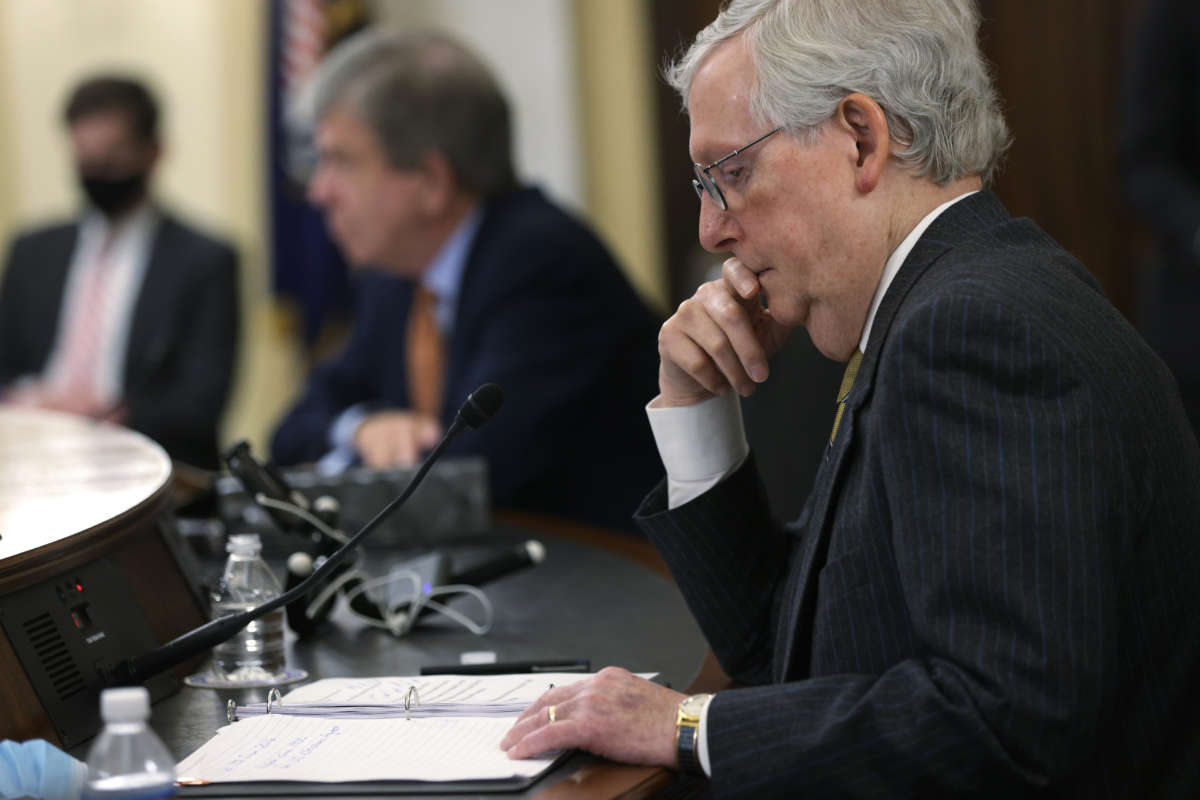Support justice-driven, accurate and transparent news — make a quick donation to Truthout today!
Republicans are concerned that the Democrats’ voting rights bill is too popular, according to a leaked call between a senior policy adviser to Senate Minority Leader Mitch McConnell (R-Kentucky) and members of prominent conservative groups.
In a recording of the call obtained by The New Yorker, conservative political operatives were upset that H.R. 1. — known as the For the People Act and, recently, S. 1 — has wide bipartisan support. They particularly took issue with provisions within the bill that would require disclosure of dark money donors, which they think could harm Republicans in particular.
Kyle McKenzie, research director for the Koch brothers-backed Stand Together, said that, “the most worrisome part” about the wide support for the bill “is that conservatives were actually as supportive as the general public was when they read the neutral description,” according to The New Yorker’s Jane Mayer report. Instead, McKenzie recommended Republicans focus on killing the bill within Congress because it’s “incredibly difficult” to sway voters against it.
The message that the legislation fought back against the influence of billionaire donors was especially hard to campaign against, the Republican operatives found. “Not even attaching the phrase ‘cancel culture’ to the bill, by portraying it as silencing conservative voices, had worked,” Mayer wrote. The Koch-affiliated organization has invested “substantial resources” into honing conservatives’ message on the bill.
The only messaging that Stand Together was able to find that worked was based on disinformation. McKenzie said that, if they told voters that the American Civil Liberties Union (ACLU) and Planned Parenthood were against the legislation, they could sway them the Republicans’ way. But the ACLU only opposes part of the legislation, and Planned Parenthood is in full support of it, The New Yorker reported.
Steve Donaldson, a senior policy adviser to McConnell, noted the minority leader’s concern about how the provisions to increase donor transparency in the For the People Act would affect his fundraising efforts. “When it comes to donor privacy, I can’t stress enough how quickly things could get out of hand,” Donaldson said in the call.
Nick Surgey, executive director of the watchdog group Documented, told The New Yorker that, while it tracks that McConnell might oppose H.R. 1 for this purpose, it’s still strange to see this amount of coordination between his staff and technically nonpartisan groups on the call.
Currently, an organization or individual with an interest in influencing politics can use dark money channels enabled in part by things like 2010’s Citizens United. Big money donors can take their donations — potentially while being bankrolled by or affiliated with large corporations — to nonprofit organizations that can then donate to politicians and their political action committees. The For the People Act seeks to make those donations public, making it easier to trace and track where campaign money is coming from.
H.R. 1 has the backing of every Democrat in the House, which passed the bill earlier this month. Polling on H.R. 1 back when it was first introduced in 2019 and from earlier this year shows that the bill is popular across a majority of Democrats, Republicans and independents.
The nearly 800-page bill seeks to end the influence of dark money on politics by requiring more thorough political donation disclosures and makes it easier to register to and cast a vote. It attempts to generally fix democracy, which House Speaker Nancy Pelosi (D-California) has noted is in “deep disrepair” in the country.
It’s been clear for months that Republicans are vehemently opposed to the bill. They’ve launched misinformation campaigns against it and called it “anti-democratic.” But they just can’t figure out how to get people to dislike the bill as much as they do.
Influencing politicians through dark money is a tactic favored by groups like the fossil fuel industry. Billionaire Charles Koch and his late brother in particular were instrumental in constructing far-reaching dark money networks across the country.
Out of the top 10 dark money groups that have spent the most since 2008, nine are conservative or right-leaning, according to a list compiled by OpenSecrets. While both parties benefit from dark money groups, only Democrats are trying to end their influence.
Republicans have been working for months to make it harder to vote ever since they lost the White House and the Senate in the 2020 elections. Republicans want to keep dark money flowing to their coffers and exert more control over elections so they can guarantee they won’t lose elections again.
A terrifying moment. We appeal for your support.
In the last weeks, we have witnessed an authoritarian assault on communities in Minnesota and across the nation.
The need for truthful, grassroots reporting is urgent at this cataclysmic historical moment. Yet, Trump-aligned billionaires and other allies have taken over many legacy media outlets — the culmination of a decades-long campaign to place control of the narrative into the hands of the political right.
We refuse to let Trump’s blatant propaganda machine go unchecked. Untethered to corporate ownership or advertisers, Truthout remains fearless in our reporting and our determination to use journalism as a tool for justice.
But we need your help just to fund our basic expenses. Over 80 percent of Truthout’s funding comes from small individual donations from our community of readers, and over a third of our total budget is supported by recurring monthly donors.
Truthout has launched a fundraiser to add 432 new monthly donors in the next 7 days. Whether you can make a small monthly donation or a larger one-time gift, Truthout only works with your support.
